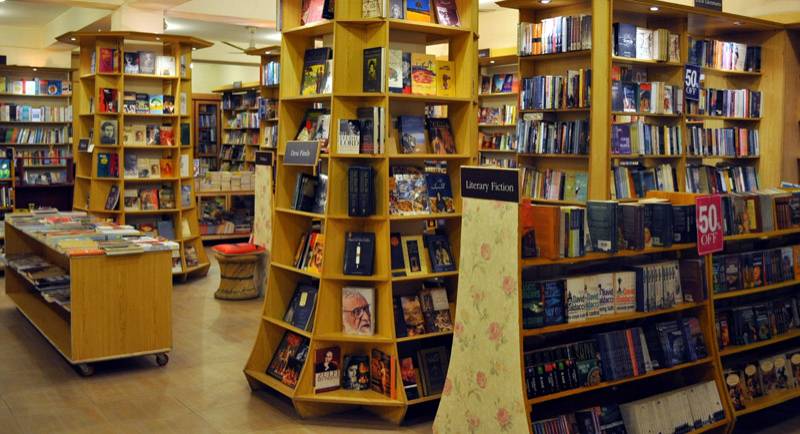
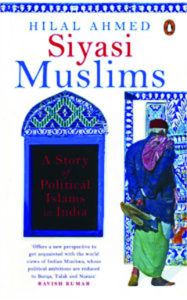
Siyasi Muslims: A Story of Political Islams in India
Hilal Ahmed
Penguin Random House (2019)
How do we make sense of the Muslims of India? Do they form a political community? Does the imagined conflict between Islam and modernity affect the Muslims’ political behaviour in this country? Are Muslim religious institutions-mosques and madrasas-directly involved in politics? Do they instruct the community to vote strategically in all elections? What are ‘Muslim issues’? Is it only about triple talaq? Are Muslims truly nationalists? Or do they continue to remain just an ‘other’ in India?
While these questions intrigue us, we seldom debate to find pragmatic answers to these queries. Examining the everydayness of Muslims in contemporary India, Hilal Ahmed offers an evocative story of politics and Islam in India, which goes beyond the given narratives of Muslim victimhood and Islamic separation.
Hilal Ahmed, associate professor, Centre for the Study of Developing Societies (CSDS), New Delhi, writes regularly on the nature of Muslim political discourse. He is the associate editor, South Asian Studies, journal of the British Association of South Asian Studies.
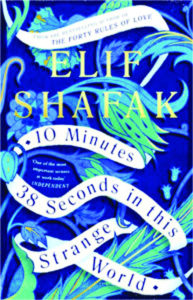
10 Minutes 38 Seconds in this Strange World
Elif Shafak
Viking (2019)
An intensely powerful new novel from the best-selling author of The Bastard of Istanbul and Honour.
“In the first minute following her death, Tequila Leila’s consciousness began to ebb, slowly and steadily, like a tide receding from the shore. Her brain cells, having run out of blood, were now completely deprived of oxygen. But they did not shut down. Not right away…”
For Leila, each minute after her death brings a sensuous memory: the taste of spiced goat stew, sacrificed by her father to celebrate the long-awaited birth of a son; the sight of bubbling vats of lemon and sugar which the women use to wax their legs while the men attend mosque; the scent of cardamom coffee that Leila shares with a handsome student in the brothel where she works. Each memory, too, recalls the friends she made at each key moment in her life – friends who are now desperately trying to find her.
Elif Shafak is a Turkish-British novelist, essayist, academic, public speaker and women’s rights activist.
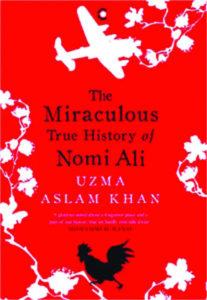
The Miraculous True History of Nomi Ali
Uzma Aslam Khan
Westland Books (2019)
Nomi and Zee are Local Borns—their father a convict condemned by the British to the Andaman Islands, their mother shipped off with him. The islands are an inhospitable place, despite their surreal beauty. In this unreliable world, the children have their friend Aye, the pet hen Priya and the distracted love of their parents to shore them up from one day to the next. Meanwhile, within the walls of the prison, Prisoner 218 D wages a war on her jailers with only her body and her memory.
When war descends upon this overlooked outpost of Empire, the British are forced out and the Japanese move in. Soon the first shot is fired and Zee is forced to flee, leaving Nomi and the other islanders to contend with a new malice. The islands—and the seas surrounding them—become a battlefield, resulting in tragedy for some and a brittle kind of freedom for others, who find themselves increasingly entangled in a mesh of alliances and betrayals.
Uzma Aslam Khan was born in Lahore and grew up in Karachi, Pakistan. She is the author of five novels, including Trespassing, The Geometry of God, Thinner than Skin, and, most recently, The Miraculous True History of Nomi Ali. Trespassing was shortlisted for the Commonwealth Prize Eurasia 2003. The Geometry of God was voted one of Kirkus Reviews’ Best Books of 2009 and won a bronze medal in the Independent Publisher Book Awards 2010. Thinner than Skin was longlisted for the Man Asian Literary Prize 2012 and the DSC Prize for South Asian Literature 2014. Her novels have been translated worldwide, including in Romania, Brazil, France, Spain, Italy, Serbia, Norway, and Sweden.
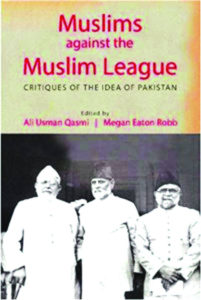
Muslims against the Muslim League
Ali Usman Qasmi, Megan Eaton Robb
Cambridge University Press (2017)
The popularity of the Muslim League and its idea of Pakistan has been measured in terms of its success in achieving the goal of a sovereign state in the Muslim majority regions of North West and North East India. It led to an oversight of Muslim leaders and organizations which were opposed to this demand, predicating their opposition to the League on its understanding of the history and ideological content of the Muslim nation. This volume takes stock of multiple narratives about Muslim identity formation in the context of debates about partition, historicizes those narratives, and reads them in the light of the larger political milieu of the period. Focusing on the critiques of the Muslim League, its concept of the Muslim nation, and the political settlement demanded on its behalf, it studies how the movement for Pakistan inspired a contentious, influential conversation on the definition of the Muslim nation.
Ali Usman Qasmi is Assistant Professor in the Department of History at the Lahore University of Management Sciences, Pakistan. He is the author of Questioning the Authority of the Past: The Ahl al-Qur’an Movements in the Punjab (2012) and The Ahmadis and the Politics of Religious Exclusion in Pakistan (2015).
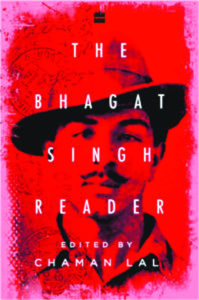
The Bhagat Singh Reader
Chaman Lal
HarperCollins Publishers India (2019)
Sporting a sharp handlebar moustache, his hat askew, Shaheed Bhagat Singh has been lionized in Indian imagination as one of the most influential revolutionaries of the Independence movement. Convicted and hanged by the British in 1931 for his role in killing a colonial police officer in the Lahore Conspiracy Case, he became a martyr at the young age of twenty-three, leaving behind an inspiring legacy. Tales of Bhagat Singh’s heroism and bravery are part of popular folklore, as it were – how he exploded bombs at the Central Legislative Assembly in Delhi and showered leaflets on the legislators before surrendering himself to the authorities, or how he led Indian political prisoners in a hunger strike demanding better conditions in jail. The Bhagat Singh Reader brings into prominence his less widely known intellectual output. It presents in a single volume a collection of his writings and thoughts: from his letters, telegrams and notices to articles that chalk out his subversive and progressive ideas, and his mails from prison to the colonial administration and judiciary. His forty-three sketches of Indian freedom fighters throw light on the larger picture of the independence struggle. This is a book that reveals Bhagat Singh the man and the thinker, the Marxist and the idealist.
Chaman Lal is professor (retired) and former chairperson of the Centre of Indian Languages at Jawaharlal Nehru University. He is honorary advisor, Bhagat Singh Archives & Resource Centre, Delhi Archives, and fellow of Panjab University, Chandigarh.

